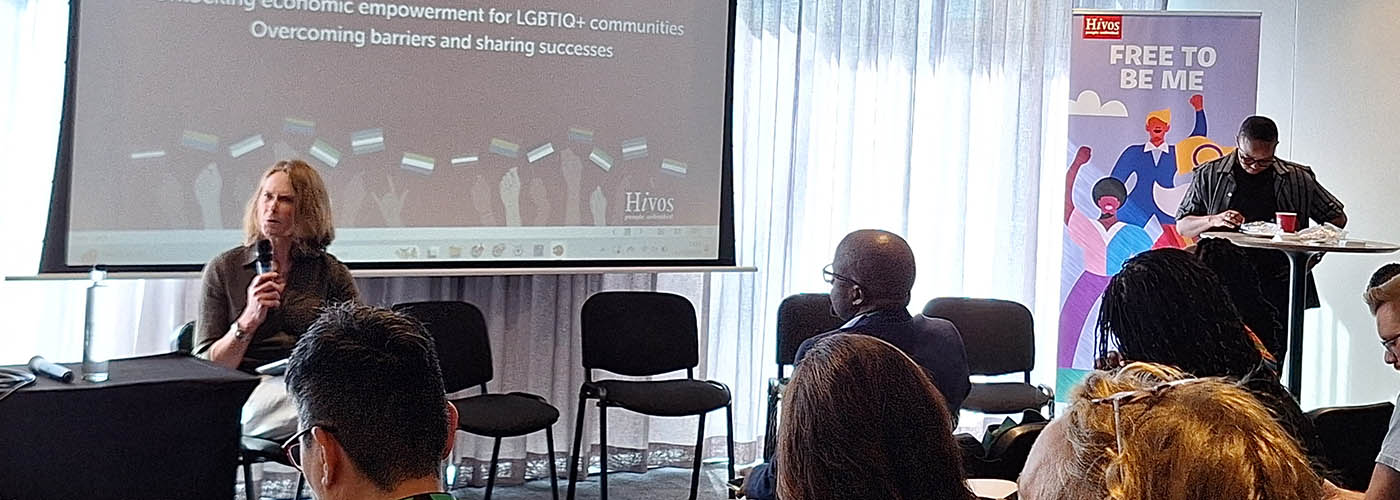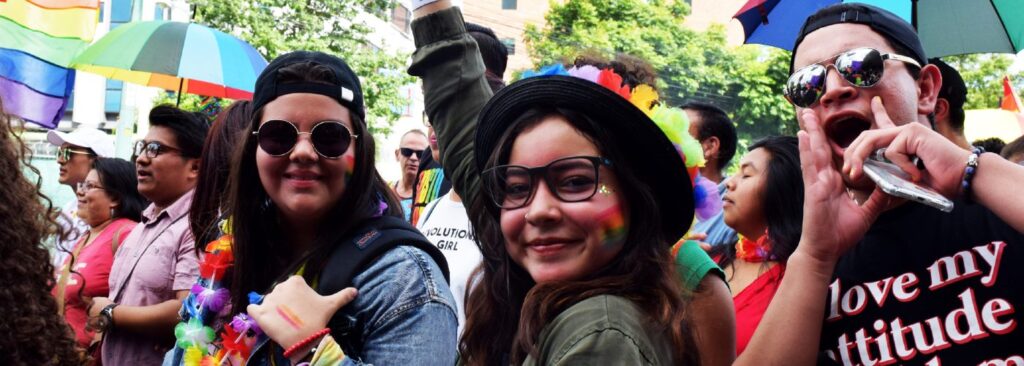Economic empowerment is a crucial element in achieving inclusion and contributing to the well-being of LGBTIQ+ communities globally. At the Free to Be Me Program side event, themed Unlocking Economic Empowerment for LGBTIQ+ Communities advocates, policymakers, grassroots leaders, donors and allies gathered to spotlight innovative solutions, discuss challenges, and go over opportunities for economic justice.
Held on the sidelines of the broader ILGA World Conference, this side event delved into the intersection of economic rights and LGBTIQ+ inclusion, offering a platform for critical conversations on how to create systems that support dignity, access, and equity for LGBTIQ+ individuals in diverse contexts.
From the moment the event kicked off, the energy in the room was palpable. The session opened with a powerful keynote speech from Hivos CEO, Anne Jellema who emphasized on the need for targeted efforts to dismantle barriers that exclude LGBTIQ+ people from economic opportunities.
“Barriers such as workplace discrimination and a lack of access to credit undermine not just individuals but entire communities, perpetuating cycles of poverty and exclusion.”
Anne Jellema, CEO of Hivos
Panel and group discussions brought together voices from various members of our Communities of Action (CoA) and LGBTIQ+ individuals from diverse regions, each shedding light on context-specific challenges and successes. Topics ranged from addressing criminalization laws in Sub-Saharan Africa, and navigating subtle workplace bias in more progressive regions to overcoming internalized barriers through LILO UP’ and engaging in advocacy with financial institutions like the World Bank and the Asian Development Bank.
Grassroots leaders shared stories of resilience, showing how LGBTIQ+ entrepreneurs have built thriving businesses in restrictive environments by leveraging informal networks and community support. Policy experts explored how inclusive economic frameworks like anti-discrimination laws and gender-sensitive policies can dismantle barriers and open doors for LGBTIQ+ individuals and the private sector was also called upon to take bold steps in fostering workplaces where diversity is celebrated, not just tolerated.
“The Free to Be Me Side Event highlighted bold strategies for scaling up advocacy and ensuring accountability in development resources for LGBTIQ+ inclusion and economic growth. My key takeaway: unlocking economic empowerment for LGBTIQ+ communities requires a holistic approach, including mental health strategies that enhance resilience and drive progress for both individual and national growth.”
Vincent, Program Manager, PEMA Kenya
One of the most striking aspects of the event was the resilience and determination of the LGBTIQ+ individuals represented. Their stories revealed a common thread; when economic empowerment becomes a reality, it serves as a catalyst for broader societal acceptance. Access to livelihoods and financial independence not only improve quality of life but also foster confidence to advocate for rights.
LGBTIQ+ advocates, policymakers, grassroots leaders, allies and donors at the F2BM Side Event
“My takeaway from the Free to Be Me session was that we need to talk about money. As queer folks, we contribute tax, vat, and so much more to our economies, yet we are demonized and excluded extensively in all the country planning that happens. Economic empowerment is key to secure livelihoods and the survival of our communities. We all want to live a comfortable life and thrive.”
Madam Jay (She/Her), Namibia CoA Facilitator
As the event wrapped up, it was clear that while progress is being made, there is still much work to do. Evidently, platforms like the Free to Be Me side event are vital in driving this agenda forward. They offer a space to not only share knowledge but also inspire action and foster alliances that can create lasting change. The event reaffirmed that unlocking economic empowerment for LGBTIQ+ communities is not just about financial stability—it is a pathway to dignity, security, and agency. Stakeholders must continue to challenge systems of exclusion while building alliances that uplift the most marginalized.
“This event was a breath of fresh air as it began to show how we can drive pink economies within our countries and the LGBTIQ+ community. My greatest take away was that spaces for community experiences and exchanges remain helpful to ensure activists feed off of each other’s energy as we keep fighting for our rights, dignity and wellbeing.”
Teddy, Program Manager at GALZ


